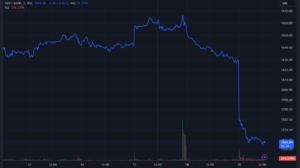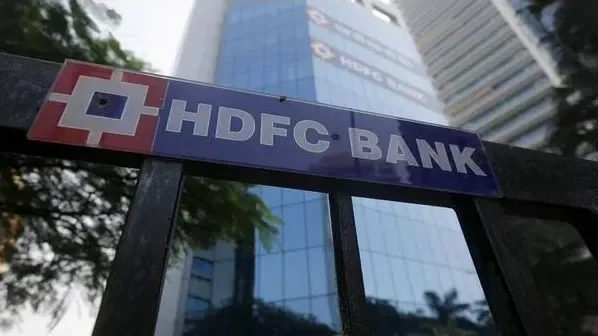HDFC Bank, one of the largest private sector banks in India, witnessed a sharp fall in its share price on Wednesday, September 20, 2023. The stock opened at ₹1,599 on BSE and dropped 4.02 per cent to ₹1,563.50 during the day’s trade. The market capitalisation of HDFC Bank also declined to nearly ₹11.8 lakh crore on BSE.
The reason behind this steep decline was the mixed views expressed by various brokerage firms on the stock after the bank’s analyst and institutional investor meeting on Monday (September 18). In this meeting, HDFC Bank discussed the possible impact of its merger with its parent company Housing Development Finance Corp. (HDFC) on its financial performance and outlook.
What are the implications of HDFC Bank merger with HDFC?
HDFC Bank and HDFC announced their merger plan in July 2023, aiming to create a financial powerhouse that can offer a wide range of products and services to customers across segments. The merger is expected to be completed by March 2024, subject to regulatory approvals.
However, the merger also entails some challenges and risks for HDFC Bank, which were highlighted by its chief financial officer Srinivasan Vaidyanathan at the analyst meeting. According to him, the merger may have a negative impact on HDFC Bank’s net interest margin (NIM), net worth and asset quality in the short term.
NIM is a key indicator of a bank’s profitability, which measures the difference between the interest income earned by the bank and the interest paid to its depositors. Vaidyanathan said that HDFC Bank’s NIM may narrow by 25 basis points (bps) due to the combined effect of incremental cash reserve ratio (CRR) and excess liquidity.
CRR is the percentage of deposits that banks have to keep with the RBI as reserves, which earns no interest. Excess liquidity refers to the surplus funds that banks have over and above their statutory requirements, which also earns low returns.
Net worth is the difference between a bank’s total assets and total liabilities, which represents its shareholders’ equity. Vaidyanathan said that HDFC Bank’s net worth may be reduced by 4 per cent in FY24 due to some accounting adjustments related to the merger. These adjustments include amortising some intangible assets of HDFC over a period of time, instead of recognising them upfront.
Asset quality is another important parameter that reflects a bank’s credit risk and loan performance. Vaidyanathan said that HDFC Bank may see a sharp increase in its non-performing assets (NPAs) in its corporate loan book due to the merger. This is because HDFC has a higher exposure to some stressed sectors such as real estate, infrastructure and power, which may affect its loan repayment capacity.
HDFC Bank share price: What are the brokerages’ views?
The analyst meeting of HDFC Bank elicited mixed reactions from different brokerage firms, who gave their ratings and target prices for the stock based on their analysis.
Nomura
Nomura, a global brokerage firm, downgraded HDFC Bank stock from ‘buy’ to ‘neutral’ and cut its target price from ₹1,970 to ₹1,800. It cited four negative surprises from the analyst meeting: net worth adjustments, NIM cuts, higher cost-to-income ratio and higher NPAs in HDFC’s corporate loan book. It also said that it found it difficult to see an upside for HDFC Bank stock in the next 12 months due to pressure on its return on assets (RoA) and loan growth.
“Our EPS cuts of 5-9 per cent over FY24-26F and BVPS cuts of about 7 per cent largely factor in these, in our view. This depresses HDFCB’s medium-term RoA (return on assets) profile further (1.7-1.8 per cent over FY24-26F) and the gap versus ICICI’s 2.2 per cent RoA profile (FY24-26F) is even starker now,” Nomura said.
Goldman Sachs
Goldman Sachs, another global brokerage firm, maintained its ‘buy’ rating on HDFC Bank stock and gave a target price of ₹2,051, implying a 26 per cent upside potential. It said that it believed that HDFC Bank was well positioned to gain substantial market share in both lending and deposits over the next few years. It also said that it expected HDFC Bank to deliver strong earnings growth and maintain its superior asset quality despite the merger challenges.
“We forecast sector-leading earnings growth of 17 per cent in FY23-26E and superior return ratios (average ROA and ROE at nearly 2 per cent and about 16 per cent, respectively, over FY24-26E) with a high degree of earnings visibility,” Goldman Sachs said.
“The stock currently trades at 1STDEV (one standard deviation) below the mean, adjusting for the SOTP (sum of the parts) value of its group businesses (e.g., HDFC Life, HDB Financial Services, HDFC AMC), which we view as compelling. As a result, we are buy-rated on HDFC Bank. We expect HDFC Bank to trade at a premium valuation multiple of about 20 times FY24-FY25E EPS/2.8 times FY24-FY25E BVPS,” they added.
HDFC Bank share price: What are the factors affecting future growth?
Apart from the merger implications and brokerages’ views, there are some other factors that may affect HDFC Bank share price in the near future.
One of them is the reappointment of Sashidhar Jagdishan as HDFC Bank managing director and chief executive officer for three more years till October 26, 2026. The Reserve Bank of India (RBI) approved his reappointment on September 19, 2023. Jagdishan took over the helm of HDFC Bank in October 2020, succeeding Aditya Puri, who retired after leading the bank for 26 years. Jagdishan has been instrumental in steering HDFC Bank through the covid-19 pandemic and the merger process.
Another factor is the performance of HDFC Bank in the second quarter of FY24, which will be announced in October 2023. The bank reported a 16.1 per cent year-on-year growth in its net profit to ₹7,729.6 crore in the first quarter of FY24, beating analysts’ estimates. The bank also reported a 14.4 per cent year-on-year growth in its net interest income to ₹17,009 crore and a 10.4 per cent year-on-year growth in its advances to ₹11.47 lakh crore in the first quarter of FY24. The bank’s asset quality also improved, with its gross NPA ratio declining to 1.47 per cent and its net NPA ratio declining to 0.48 per cent in the first quarter of FY24.
HDFC Bank share price: What is the future outlook?

HDFC Bank share price has been underperforming the benchmark Sensex in the last one year. HDFC Bank shares have gained only 4 per cent while the Sensex has risen by about 13 per cent in the last one year period. The stock hit its 52-week high of ₹1,757.80 on July 3 this year and its 52-week low of ₹1,365.05 on September 30 last year on BSE.
The outlook for HDFC Bank share price depends on how well the bank manages the merger challenges and leverages the merger opportunities. The bank has a strong franchise, a loyal customer base, a diversified product portfolio, a robust digital platform and a sound corporate governance. These factors may help the bank overcome the short-term headwinds and achieve long-term growth and profitability.
However, the bank also faces some risks and uncertainties, such as regulatory changes, competitive pressures, macroeconomic conditions and more. These factors may affect the bank’s performance and valuation in the near future.
Therefore, investors should keep a close watch on HDFC Bank share price movements and take informed decisions based on their risk appetite and return expectations.
Disclaimer:
The information provided in this article is for educational or informational purposes only and does not constitute professional financial or investment advice. The opinions expressed in this article are those of the author and do not necessarily reflect the views of Stock Market Release or its affiliates. The information in this article is based on sources that we believe to be reliable, but we do not guarantee its accuracy or completeness. The past performance of any investment or strategy does not guarantee future results or returns. Investing involves risks and you may lose some or all of your money. You should not rely solely on this article to make any investment decisions. You should do your own research and consult a qualified financial advisor before investing.

